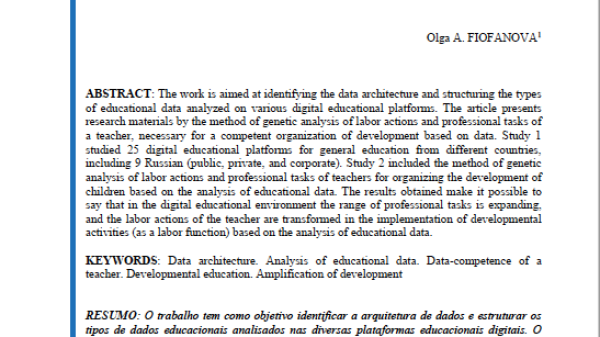
Fiofanova O.A. Data architecture on digital educational platforms and data- competence of teachers. RPGE-UNESP(h) - Revista on line de Politica e Gestao Educacional (ISSN15199029- WoS).
ABSTRACT: The work is aimed at identifying the data architecture and structuring the types of educational data analyzed on various digital educational platforms. The article presents research materials by the method of genetic analysis of labor actions and professional tasks of a teacher, necessary for a competent organization of development based on data. Study 1 studied 25 digital educational platforms for general education from different countries, including 9 Russian (public, private, and corporate). Study 2 included the method of genetic analysis of labor actions and professional tasks of teachers for organizing the development of children based on the analysis of educational data. The results obtained make it possible to say that in the digital educational environment the range of professional tasks is expanding,
and the labor actions of the teacher are transformed in the implementation of developmental activities (as a labor function) based on the analysis of educational data.
KEYWORDS: Data architecture. Analysis of educational data. Data-competence of a
teacher. Developmental education. Amplification of development.
Introduction
This work touches upon the dimension of education on which its developmental
potential depends - the organization of the development of schoolchildren based on the analysis of educational data. According to the results of the study, the types of educational data are characterized and classified, the analysis of which is available to teachers on digital educational platforms, services and is possible to solve the problems of organizing the development of schoolchildren. In this regard, such opportunities for the analysis of educational data for the organization of development necessitate the competence of data analysis among teachers in practice. Accordingly, there is a need for a conceptual rethinking of data science in a sectoral aspect - in the field of education. Data Driven Pedagogy as a concept of pedagogical theory and the phenomenon of pedagogical practice has a history of development no more than 10 years (FIOFANOVA, 2020a). This concept allows to deepenthe theory of developmental education in a new perspective (VYGOTSKY, 2004; DAVYDOV, 1996; MARGOLIS, 2020) and the practice of reflective education based on the awareness of educational results and analytics of educational data (BETELIN et al., 2020;
KENNEDY; PETERS; THOMAS, 2012; FIOFANOVA, 2020b; ICEDM, 2021).
It is necessary to turn to psychology and logic in the study of developmental processes in educational conditions. Development psychology is disclosed in the theory of developmental education (VYGOTSKY, 2004; DAVYDOV, 1996; MARGOLIS, 2020) through the activity methods of education, age characteristics of the child's leading activity, the zone of the child's proximal development. Logic (content-genetic logic) in the study of the Data architecture on digital educational platforms and data- competence of teachers RPGE– Revista on line de Política e Gestão Educacional, Araraquara, v. 25, n. esp. 3, p. 1700-1716, set. 2021. e-ISSN: 1519-9029
DOI: https://doi.org/10.22633/rpge.v25iesp.3.15591 1702
development of activity reveals the meaning of the reflection of activity and the methods of its implementation, the situation of the rupture of the means of activity (SHCHEDROVITSKY, 1993). "Pedagogical methods can be conditionally decomposed into pedagogical-logical" and "pedagogical-psychological" (SHCHEDROVITSKY et al., 1993; DECREE OF THE PRESIDENT OF THE RUSSIAN FEDERATION NO. 642, 2016), to be asked to students, - everywhere the only “working” and effective today are not psychological or sociological and not special-subject (mathematical, physical, chemical, etc.), but only logical means and methods ”(Pedagogy and Logic) (SHCHEDROVITSKY et al., 1993; FIOFANOVA et al., 2020a).
In the context of the development of digital educational platforms and services for the
analysis of educational data, teachers gained access to systematized educational data (data on the results of mastering educational programs, data on the personal choice of profiles, subjects, levels of difficulty, ways of solving problems, etc.), which became the basis for for the application of the logic of the design of educational programs from the result, the design of educational activities based on the results of the assessment of added value (Margolis, 2020), as well as the basis for the reflection of educational activities and educational results organized with students. That is, in addition to psychological means and knowledge about psychological patterns of development in educational conditions, logical analysis of data in
education began to be used in pedagogical activity. In the context of the interdisciplinarity of the development of scientific knowledge, the methods of data science are integrated into pedagogy, on the basis of which the methodology and technology for the analysis of educational data is developed. Based on the analysis of educational data, the teacher carries out the production of means of developmental education, upbringing (FIOFANOVA, 2020b).
Data analysis as a logical tool for organizing activities, production, human
communities has become intensively used in various fields: in the information industries (Anderson, 2017), in business (INMON; LINSTEDT; LEVINS; 2019; DHANRAJANI, 2018), in HR / talent management (NOCKER; VANIA, 2019; Sullivan, 2012), as well as in the field of education (BETELIN et al., 2020; KENNEDY; PETERS; THOMAS, 2012; FIOFANOVA, 2020b). In an interdisciplinary context, data analysis becomes the subject of discussion at various international conferences (EDM, 2021; ICEDM 2021, p. 15). International Conference on Educational Data Mining, 2021; International Conference on Educational Data Mining (ICEDM, 2021). (см текст статьи в прикрепленном файле)
















































